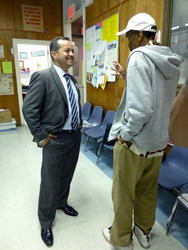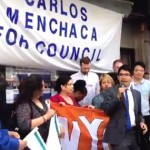Zead Ramadan jokingly calls himself a “Dominican Arab.” He plays baseball and speaks fluent Spanish. But as his name suggests he isn’t Latino. Ramadan is the son of Palestinian immigrants who moved from Kuwait to Washington Heights 42 years ago.
Ramadan is running in a crowded field of candidates in the Democratic Primary in New York City Council District 7. If elected he would be the first Arab-American to serve on the council.
Ramadan’s candidacy comes at a time when the NYPD is facing accusations of racially profiling Arabs following the 9/11 attacks—highlighting continued tensions between law enforcement and this ethnic community.
Listen to Zead Ramadan on the campaign trail talking about his views on immigration reform and support he’s gotten from Arab-Americans in New York:
The conversation ahead of Tuesday’s Primary election in New York City has been dominated by the contest to succeed Michael Bloomberg as the next mayor. Between Anthony Weiner’s sexting and and recent public blowup when a voter called his wife an Arab (she is of South Asian heritage), and Public Advocate Bill de Blassio’s son Dante’s impressive Afro, City Council races just aren’t getting as much attention.
The race in District 7 offers its own version of ethnic and racial politics. In the heavily Hispanic district, Ramadan is seen as the underdog, running against Democratic heavy-hitter Mark Levine who has won endorsements from de Blasio, who leads the field of Democratic mayoral candidates according to recent polls, Manhattan Borough President Scott Stringer, as well as major labor unions SEIU and the United Federation of Teachers. The district stretches from Manhattan’s Upper West Side through West Harlem to the northern-most point of Washington Heights.
Levine is white and Jewish, leading some to suggest early in his campaign that he is not qualified to represent the overwhelmingly black and Hispanic district. It’s a charge that Levine and his supporters vigorously deny.

Zead Ramadan campaigning at the Hamilton Grange Senior Center; photo: Von Diaz
According to the most recent numbers from New York City’s Campaign Finance Board, Ramadan is slightly ahead of Levine in campaign fundraising. Ramadan also employed a classic maneuver in an attempt to discredit his opponent by mounting a legal challenge to 100 of the 8,000 signatures Levine collected to get his name on the Primary ballot (even though he only needed 450). In response, Levine’s supporters accused Ramadan of harassing and intimidating Levine’s petition gatherers.
In his campaign, Ramadan has focused on creating jobs, education, affordable housing, and increasing opportunities for small business owners such as himself. He owns X Cafe on the newly named Juan Rodriguez Way (formerly Broadway) in Washington Heights.
In many ways Ramadan represents the classic New York immigrant success story, a poor kid who grew up to be a community leader and a small businessman. He is also an example of the city’s hybrid culture and the new generation of city politicians (such as Comptroller John Liu) who are building coalitions that include a wide range of ethnic communities.
Tuesday will determine whether Ramadan has made the cut. Either way, he appears to be emerging as a new face to look out for in New York City politics.
Fi2W is supported by the David and Katherine Moore Family Foundation and the Ralph E. Odgen Foundation.




